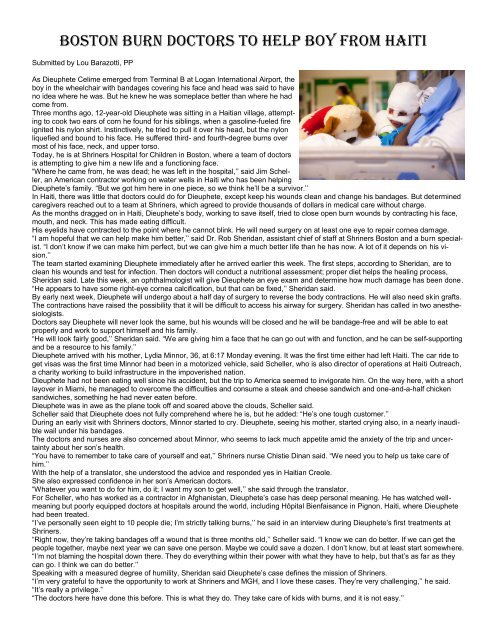The Fez - Kismet Shriners
The Fez - Kismet Shriners
The Fez - Kismet Shriners
You also want an ePaper? Increase the reach of your titles
YUMPU automatically turns print PDFs into web optimized ePapers that Google loves.
Boston Burn Doctors to help Boy From Haiti<br />
Submitted by Lou Barazotti, PP<br />
As Dieuphete Celime emerged from Terminal B at Logan International Airport, the<br />
boy in the wheelchair with bandages covering his face and head was said to have<br />
no idea where he was. But he knew he was someplace better than where he had<br />
come from.<br />
Three months ago, 12-year-old Dieuphete was sitting in a Haitian village, attempting<br />
to cook two ears of corn he found for his siblings, when a gasoline-fueled fire<br />
ignited his nylon shirt. Instinctively, he tried to pull it over his head, but the nylon<br />
liquefied and bound to his face. He suffered third- and fourth-degree burns over<br />
most of his face, neck, and upper torso.<br />
Today, he is at <strong>Shriners</strong> Hospital for Children in Boston, where a team of doctors<br />
is attempting to give him a new life and a functioning face.<br />
“Where he came from, he was dead; he was left in the hospital,’’ said Jim Scheller,<br />
an American contractor working on water wells in Haiti who has been helping<br />
Dieuphete’s family. “But we got him here in one piece, so we think he’ll be a survivor.’’<br />
In Haiti, there was little that doctors could do for Dieuphete, except keep his wounds clean and change his bandages. But determined<br />
caregivers reached out to a team at <strong>Shriners</strong>, which agreed to provide thousands of dollars in medical care without charge.<br />
As the months dragged on in Haiti, Dieuphete’s body, working to save itself, tried to close open burn wounds by contracting his face,<br />
mouth, and neck. This has made eating difficult.<br />
His eyelids have contracted to the point where he cannot blink. He will need surgery on at least one eye to repair cornea damage.<br />
“I am hopeful that we can help make him better,’’ said Dr. Rob Sheridan, assistant chief of staff at <strong>Shriners</strong> Boston and a burn specialist.<br />
“I don’t know if we can make him perfect, but we can give him a much better life than he has now. A lot of it depends on his vision.’’<br />
<strong>The</strong> team started examining Dieuphete immediately after he arrived earlier this week. <strong>The</strong> first steps, according to Sheridan, are to<br />
clean his wounds and test for infection. <strong>The</strong>n doctors will conduct a nutritional assessment; proper diet helps the healing process,<br />
Sheridan said. Late this week, an ophthalmologist will give Dieuphete an eye exam and determine how much damage has been done.<br />
“He appears to have some right-eye cornea calcification, but that can be fixed,’’ Sheridan said.<br />
By early next week, Dieuphete will undergo about a half day of surgery to reverse the body contractions. He will also need skin grafts.<br />
<strong>The</strong> contractions have raised the possibility that it will be difficult to access his airway for surgery. Sheridan has called in two anesthesiologists.<br />
Doctors say Dieuphete will never look the same, but his wounds will be closed and he will be bandage-free and will be able to eat<br />
properly and work to support himself and his family.<br />
“He will look fairly good,’’ Sheridan said. “We are giving him a face that he can go out with and function, and he can be self-supporting<br />
and be a resource to his family.’’<br />
Dieuphete arrived with his mother, Lydia Minnor, 36, at 6:17 Monday evening. It was the first time either had left Haiti. <strong>The</strong> car ride to<br />
get visas was the first time Minnor had been in a motorized vehicle, said Scheller, who is also director of operations at Haiti Outreach,<br />
a charity working to build infrastructure in the impoverished nation.<br />
Dieuphete had not been eating well since his accident, but the trip to America seemed to invigorate him. On the way here, with a short<br />
layover in Miami, he managed to overcome the difficulties and consume a steak and cheese sandwich and one-and-a-half chicken<br />
sandwiches, something he had never eaten before.<br />
Dieuphete was in awe as the plane took off and soared above the clouds, Scheller said.<br />
Scheller said that Dieuphete does not fully comprehend where he is, but he added: “He’s one tough customer.’’<br />
During an early visit with <strong>Shriners</strong> doctors, Minnor started to cry. Dieuphete, seeing his mother, started crying also, in a nearly inaudible<br />
wail under his bandages.<br />
<strong>The</strong> doctors and nurses are also concerned about Minnor, who seems to lack much appetite amid the anxiety of the trip and uncertainty<br />
about her son’s health.<br />
“You have to remember to take care of yourself and eat,’’ <strong>Shriners</strong> nurse Chistie Dinan said. “We need you to help us take care of<br />
him.’’<br />
With the help of a translator, she understood the advice and responded yes in Haitian Creole.<br />
She also expressed confidence in her son’s American doctors.<br />
“Whatever you want to do for him, do it; I want my son to get well,’’ she said through the translator.<br />
For Scheller, who has worked as a contractor in Afghanistan, Dieuphete’s case has deep personal meaning. He has watched wellmeaning<br />
but poorly equipped doctors at hospitals around the world, including Hôpital Bienfaisance in Pignon, Haiti, where Dieuphete<br />
had been treated.<br />
“I’ve personally seen eight to 10 people die; I’m strictly talking burns,’’ he said in an interview during Dieuphete’s first treatments at<br />
<strong>Shriners</strong>.<br />
“Right now, they’re taking bandages off a wound that is three months old,’’ Scheller said. “I know we can do better. If we can get the<br />
people together, maybe next year we can save one person. Maybe we could save a dozen. I don’t know, but at least start somewhere.<br />
“I’m not blaming the hospital down there. <strong>The</strong>y do everything within their power with what they have to help, but that’s as far as they<br />
can go. I think we can do better.’’<br />
Speaking with a measured degree of humility, Sheridan said Dieuphete’s case defines the mission of <strong>Shriners</strong>.<br />
“I’m very grateful to have the opportunity to work at <strong>Shriners</strong> and MGH, and I love these cases. <strong>The</strong>y’re very challenging,’’ he said.<br />
“It’s really a privilege.”<br />
“<strong>The</strong> doctors here have done this before. This is what they do. <strong>The</strong>y take care of kids with burns, and it is not easy.’’



